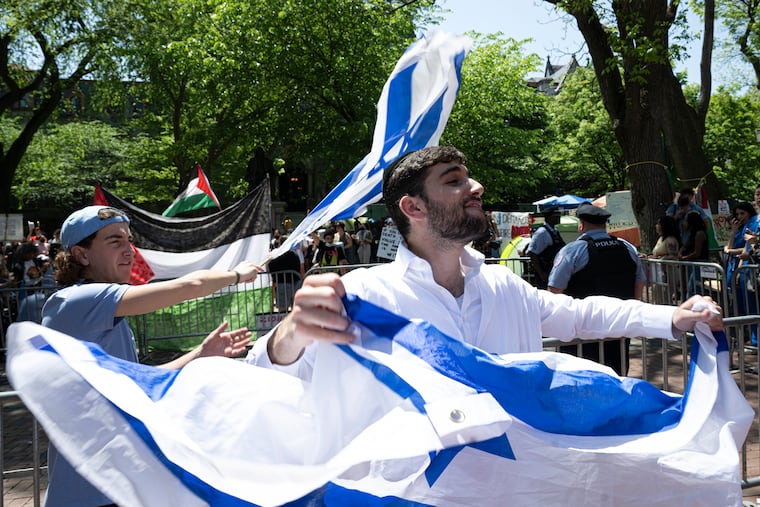With Oct. 7 approaching, pro-Israel Jewish college students in Philly and advocates urge campuses to have a plan
A coalition of Jewish college students and advocates in the Philly region want college campuses to prepare for a potential wave of antisemitism as Oct. 7 nears.

With the one-year anniversary of the Oct. 7 Hamas attack on Israel approaching, a coalition of Jewish students in the Philadelphia region and an advocacy organization that “stands up for Israel’s right to exist” are calling for campuses to be prepared to address potential antisemitism.
Since the outbreak of the Israel-Hamas war, groups like the Anti-Defamation League have reported a surge in antisemitic incidents in Pennsylvania.
With the input of Hillel International, the largest Jewish campus organization in the world, and other partners, the American Jewish Committee published a guide to address antisemitism on campuses, where the organization said hostilities toward Jewish students have increased since the beginning of the war. The committee said it sent the guidelines to universities in the Philadelphia region and across the country.
“We cannot have a repeat of what happened on dozens of campuses last spring, when pro-Palestinian protests often verged into outright antisemitism and left Jewish students and faculty feeling intimidated, harassed, and at times worried about their physical safety,” said Marcia Bronstein, regional director of the American Jewish Committee’s Philadelphia and Southern New Jersey chapter.
The committee sent universities several recommendations, including prioritizing campus security around Jewish cultural and religious spaces, clarifying the rules around campus protests, and creating task forces to fight antisemitism on campus.
Some area schools have already rolled out some variation of these recommendations after their campuses were embroiled in protests opposing Israel’s retaliatory attack on Gaza, where more than 40,000 people have been killed, according to Palestinian health authorities. Roughly 1,200 people were killed and about 250 kidnapped in Hamas’ Oct. 7 attack.
» READ MORE: Philly colleges are bracing for a potentially volatile fall semester after a year of encampments and resignations
After an especially tumultuous stretch that was bookended by the December resignations of University of Pennsylvania president Liz Magill and former board chair Scott L. Bok and the pro-Palestinian encampment in May, Penn announced plans to open an office of religious and ethnic inclusion this fall.
Last month, Temple University said it was investigating a student pro-Palestinian demonstration held outside the Temple Hillel. Richard Englert, Temple’s president, said “intimidation and harassment tactics like those” would not be tolerated, which the committee applauded as a step in the right direction.
As Drexel University students prepare to move onto campus at the end of the week, the administration sent a note Monday to spell out “clear, comprehensive, enforceable rules and guidelines for managing campus protests, demonstrations and other forms of activism.” The rules, which reaffirm an encampment ban, are effective immediately. The school has also erected fencing around Korman Quad, where there was an encampment in May, that will remain in place “as long as the credible threat of an illegal encampment or occupation of our campus remains.”
To area students backing the committee’s suggestions, action cannot come soon enough. At a news conference Monday, Jewish students from Temple, Penn, Drexel, and Bryn Mawr College described the previous academic year as one that led them to feel isolated and silenced, especially because antisemitism is not always obvious.
“It’s not always swastikas or explicit hate speech,” said Eli Evans, a Temple law student. “It can be more insidious, woven into ideas that seem to pass as political discourse, but targets Jewish individuals and creates an atmosphere of fear.”
Lori Ackerman, a sophomore at Bryn Mawr College, described how she felt the pressure to become a geopolitical expert overnight as a result of her faith. She said she hopes the universities can empower students like her who are looking for common ground and have their own complicated feelings about the war.
“We need you to allow all of us to work through our messy feelings in your spaces, even if it hurts and is uncomfortable,” she said.
It is unclear if Penn, Temple, and Bryn Mawr are taking any additional precautions ahead of Oct. 7. Representatives were not immediately available for comment.